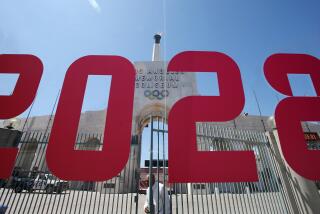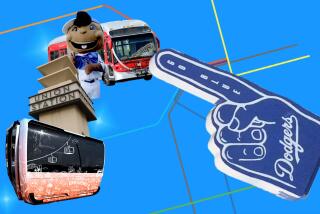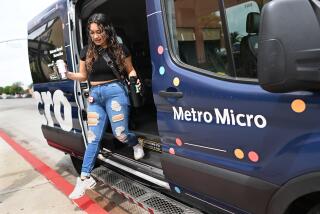Transit District Directors Question Dial-a-Ride, Car-Pooling Expenses
- Share via
Citing strike-related bus ridership losses, Orange County Transit District board members Monday questioned both an estimated $500 expense per commuter for arranging car pools and the expansion of costly dial-a-ride service.
County Supervisors Roger R. Stanton and Don R. Roth, who serve on the five-member OCTD board, warned separately that costs in each program should be watched carefully. Their comments came during the transit panel’s first look at the bus agency’s proposed $82.5-million, 1987-88 operating budget, which is 2% above the current $80.6-million budget.
Blaming December’s 14-day bus drivers’ strike, OCTD officials said ridership is about 5.2% below last year’s levels.
“It takes about six months to a year to recover” from such a strike, OCTD General Manager James P. Reichert said. Without the strike, the number of passenger trips would have declined only one-half of 1%, according to Reichert’s figures.
Reichert said concern about restoring ridership has caused OCTD’s staff to recommend postponing a proposed nickel fare increase from June until February. Instead of simply adding 5 cents to the current 75-cent fare for everyone, the district may charge extra for transfers or use other selective fare increases, said OCTD spokeswoman Joanne Curran.
In reviewing the proposed operating budget, Roth said he was alarmed by figures showing that cost per dial-a-ride passenger trip is $5.03, only 13.32% of which is recovered from fare box revenues. Regular OCTD bus service costs about $2.16 per passenger trip, of which about 21% is recovered from the fare box.
OCTD officials said expansion of door-to-door dial-a-ride service would help boost ridership and would reduce per passenger costs eventually. They said only a small increase in the trip-by-appointment van service is projected, involving areas that do not have a strong enough market to support a regular OCTD bus route.
Stanton, calculating roughly that each car-pooler matched through the OCTD-sponsored Commuter Network program is costing the district about $500, complained that board members don’t have enough information to determine if the cost is appropriate.
OCTD officials said Stanton’s rough calculations on car-pooling promotional costs are misleading because part of the budget set aside for Commuter Network includes development of flexible work schedules at private companies and other strategies to reduce rush-hour traffic. They said they will supply board members with a detailed breakdown based on the amount of money actually spent on developing car and van-pools.
With the help of 118 employers, Commuter Network--which operates the 636-RIDE telephone system that dispenses car-pool information--placed a record 1,240 people in ride-sharing arrangements during the quarter ending March 31.
OCTD officials said they did not have figures immediately available on how many of the ride-share arrangements might have been related to the bus drivers’ walkout that ended Dec. 21. But during the strike, Commuter Network fielded 417 telephone calls contrasted with a normal weekly rate of about 80 calls.
Also Monday, Reichert unveiled a proposed 1987-88 capital expenditure budget of $25.8 million--mostly for a previously-announced purchase of 75 large buses and 100 dial-a-ride vans--44% above the current capital projects budget of $17.9 million. Most of the new vehicles will replace aging vehicles with mechanical problems.
And while reviewing the district’s quarterly financial performance, Reichert revealed that internal audits enabled the district to recover $318,000 from an insurer who moved to Oregon without paying claims on public liability policies held by several California clients, including OCTD.
After hearing public testimony, the OCTD board is scheduled to vote June 15 on the proposed 1987-88 budget.
More to Read
Sign up for Essential California
The most important California stories and recommendations in your inbox every morning.
You may occasionally receive promotional content from the Los Angeles Times.










